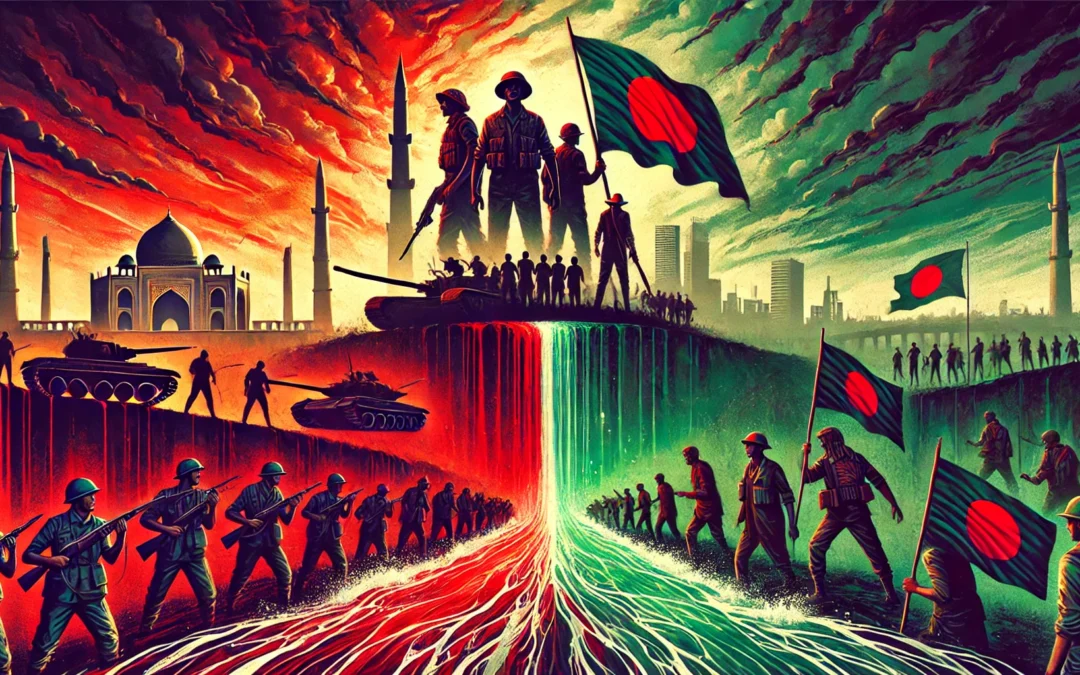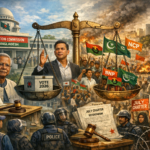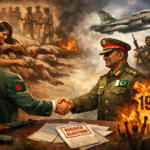Introduction: A Legacy Under Siege
Bangladesh, forged in the fires of one of the most brutal liberation struggles of the 20th century, is facing an unprecedented attack on its legacy. The neo-radical ideologues—brainwashed pseudo-revolutionaries inspired by regressive dogmas like those propagated by the Hizb ut-Tahrir (HuT)—have risen to prominence, positioning themselves as the self-proclaimed ‘purifiers’ of Bangladesh’s identity. But under the guise of this false revolution, they disgrace the very foundation of Bangladesh’s existence, tarnishing the legacy of the Father of the Nation, Sheikh Mujibur Rahman, and undermining the sacrifices made by millions. By distorting history and denigrating national heroes, they threaten to erode the collective pride and unity that Bangladesh’s citizens have cherished for generations. This essay argues that the people of Bangladesh will not stand for this shameful assault on their legacy; the spirit of 1971 will rise once again to defeat these revisionists and preserve the truth of their hard-won freedom.
The Historical Pillars of Bangladesh’s Identity
To understand the gravity of these revisionist attacks, one must first appreciate the significance of Bangladesh’s birth. The independence of Bangladesh in 1971 was not just a political transition; it was the embodiment of a cultural, linguistic, and national identity. The people, led by Sheikh Mujibur Rahman, stood together against oppression, sacrificing lives to secure freedom and dignity for future generations. The Father of the Nation became a symbol of this struggle, as he encapsulated the hopes, dreams, and resilience of millions who desired to live in a country that would respect and reflect their Bengali heritage.
Bangladesh’s independence represents more than just a victory over tyranny; it embodies the ideals of self-determination, justice, and unity in diversity. Bangladeshis remember the Liberation War as a turning point—a moment where the shared dreams of a people coalesced into the reality of a nation. This history is sacred, and attempts to reinterpret it with politically motivated distortions attack the very soul of the country.
The Neo-Radical Threat: Revisionism in Disguise
The recent emergence of neo-radical factions, influenced by groups such as Hizb ut-Tahrir, seeks to rewrite Bangladesh’s national narrative. These individuals, often operating under religious pretences, claim that the ideals of Bangladesh’s independence are obsolete or, worse, morally corrupt. They go so far as to label Sheikh Mujibur Rahman a ‘fascist,’ attempting to rob the Father of the Nation of his rightful place in history. By casting aspersions on his legacy, they hope to destabilize the foundational narratives of Bangladesh and replace them with their own ideologically driven agenda.
This attack on Bangladesh’s historical identity is no mere academic exercise; it is a concerted effort to replace secular nationalism with an extremist ideology. The HuT-aligned pseudo-revolutionaries believe that erasing the legacy of Bangladesh’s freedom fighters will open the door for their interpretation of governance, which dismisses pluralism, democracy, and national pride. But this ideology, incompatible with the values of most Bangladeshis, has only alienated the public. Bangladeshi citizens know their history and value the sacrifices that built their nation. These pseudo-revolutionaries underestimate the pride and resilience of the people they claim to represent.
The Insult to Sacrifice: Undermining Liberation War Heroes
The neo-radicals’ attempts to erase or belittle the contributions of the Liberation War heroes is not only offensive but reveals their lack of connection to the pulse of Bangladesh. The Liberation War claimed the lives of countless brave souls, from soldiers to civilians, who risked everything for a vision of a free and just society. These martyrs fought not only for political freedom but for the preservation of their language, culture, and identity. To label these heroes as anything but patriots is an insult to their memory and an affront to the values of freedom and justice.
In undermining these heroes, the neo-radicals have not only disgraced the martyrs but have also demonstrated a dangerous disregard for the very people they claim to represent. The people of Bangladesh understand the price of their freedom, and they feel an abiding sense of duty to honor those who paid it. They will not stand by while a few misguided individuals attempt to rewrite the most painful and triumphant chapter of their history.
The Resilience of the People: A Nation’s Promise to its Heroes
Bangladesh is a land of resilient people, who, through floods, political turbulence, and economic challenges, have remained steadfast in their pride and identity. The neo-radicals who seek to destabilize this unity and rewrite history will find themselves isolated and unsupported by the very populace they wish to influence. Bangladeshis are deeply connected to the legacy of the Liberation War, and any attempt to defame their history is met with fierce opposition. Citizens of all generations honour the memory of their heroes and see any revisionist attempt as a direct assault on their personal and collective identity.
Furthermore, Bangladesh’s youth, in particular, are more aware and connected than ever before. Social media, educational reforms, and a renewed interest in historical literacy have equipped young Bangladeshis with the tools to understand and defend their history. These youth will not be swayed by propaganda or revisionist rhetoric; instead, they represent the torchbearers of Bangladesh’s legacy. They honour the sacrifices of their forebears, and they are prepared to rise against any force that seeks to disparage those sacrifices.
The Inevitable Collapse of the Revisionist Agenda
History has shown that regimes or movements built on deception and revisionism cannot survive in the long term. Just as other revisionist movements around the world have collapsed under the weight of their falsehoods, so too will this movement fail. The people of Bangladesh have experienced too much, lost too many, and achieved too great a victory to allow a few neo-radical ideologues to tear apart the fabric of their identity.
The collapse of the revisionist agenda is inevitable because it lacks public support and is built on a foundation of lies. Bangladeshis value truth, justice, and respect for their history, and they are unwilling to compromise these values for the hollow promises of neo-radical ideologues. The HuT-aligned pseudo-revolutionaries, blinded by their ambitions, fail to realize that they stand on fragile ground. The people will eventually rise, bringing an end to this misguided venture, preserving the values for which they fought, and safeguarding the legacy of those who gave their lives for Bangladesh’s freedom.
A Call to Action: Upholding the True Legacy of Bangladesh
In these times of ideological assault on Bangladesh’s history, it is crucial for all Bangladeshis to reaffirm their commitment to their national identity and historical truth. Citizens must engage in education, both formal and informal, to ensure that the younger generations understand the significance of the Liberation War and the sacrifices that came with it. Schools, universities, and public forums should be encouraged to promote honest discussions about the history of Bangladesh, emphasizing the contributions of heroes like Sheikh Mujibur Rahman and the countless others who laid the foundation of the nation.
Furthermore, media platforms, both traditional and digital, have a duty to highlight the truth, countering the false narratives spread by these revisionist forces. By creating a culture of awareness and pride, Bangladesh can protect itself against any attempt to distort its history. The people of Bangladesh are empowered, united, and unwilling to accept any narrative that diminishes their heritage.
Conclusion: A Nation’s Unbreakable Bond with Its History
Bangladesh’s history is not up for negotiation nor a canvas for revisionist whims. The neo-radical, HuT-aligned pseudo-revolutionaries may try to sow seeds of division. Still, they will find themselves uprooted by the deep-seated pride and resilience of the Bangladeshi people. These false revolutionaries, who brazenly insult the Father of the Nation and label freedom fighters as fascists, are on borrowed time. The people of Bangladesh, bound by an unbreakable bond with their history, will rise to defend their identity, ensuring that the true legacy of the Liberation War and the vision of Sheikh Mujibur Rahman remain intact.
The future of Bangladesh is secure, not because of a handful of misguided ideologues, but because of the unyielding spirit of its people. The nation will emerge from this challenge stronger, more united, and more committed than ever to upholding the values of freedom, justice, and truth. The legacy of Bangladesh’s independence cannot be rewritten, and those who attempt it will find themselves on the wrong side of history. The spirit of 1971 lives on in the hearts of all Bangladeshis, a powerful reminder that the truth will always prevail.






